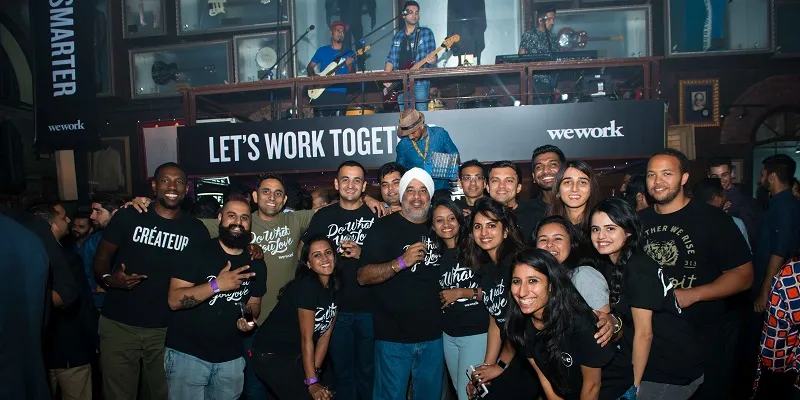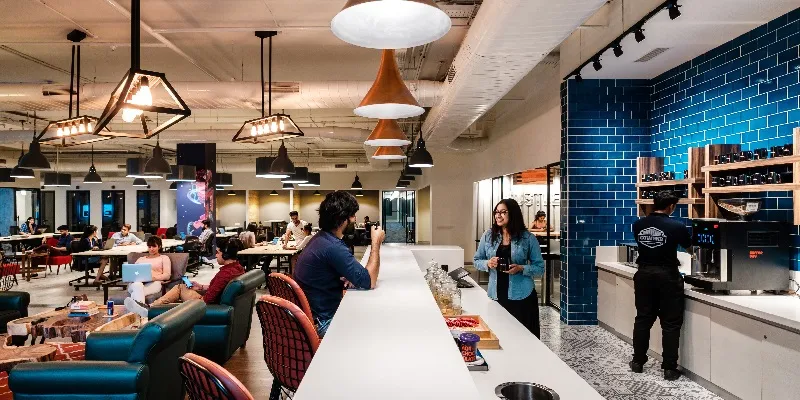WeWork versus CoWrks: how two real estate scions are betting big on the co-working space
How Karan Virwani and Sidharth Menda succeeded in convincing their traditional businessman fathers to get into new-age ventures with WeWork and CoWrks

Key highlights
- Expect investments of $400 million per year for the next five years in the space.
- CoWrks of RMZ Group wants to build a network of entrepreneurs within India.
- Both WeWork and CoWrks are creating something invaluable for the Indian startup ecosystem.
“Do what you love.” These words in white stare at you from the black T-shirts sported by a handful of young people as they move about with urgency at the Embassy Galaxy in the heart of Bengaluru, where WeWork’s 1.4 lakh sqft flagship co-working office is being readied for launch on July 1.
In fact, WeWork, the US-based shared workspace provider, which entered India in November last year, plans to simultaneously launch an office in Mumbai.
These two deals have no doubt served to put the focus firmly on the co-working space in the country, and the credit for this as well as for bringing WeWork to India goes to 25-year-old Karan Virwani, the scion of Embassy Group, the Bengaluru-based commercial real estate developer.
“Before convincing and partnering with WeWork, I had to discuss the business opportunity with my father and convince him that we were betting on the future of office spaces,” says Karan, exemplifying the 'Do what you love' motto.
The Bengaluru co-working office is being set up as part of an agreement WeWork signed with the Embassy Group in November last year. With $25 million invested in the WeWork India JV, Karan is thinking of expansion as a way to stay ahead of the competition.
It’s not just Karan who is betting big on the co-working space though. Sidharth Menda of CoWrks is equally optimistic about the space and has already got a year's headstart in the game.
Incidentally, Karan and Sidharth are friends and like Karan, Sidharth is also a scion of a real estate group, the RMZ Corp, a Bengaluru-based realty developer. Sidharth, like Karan, had to work hard to convince his family and other promoters about co-working space as a business of the future.
More on the battle between these two later, but the industry is crowding up with co-work space companies.
The co-working space
Currently, there are more than 160 players in the co-working space who run more than 350 operational centres across tier-1 and tier-2 cities in the country, according to a report by Colliers International. The better-known names among these are InstaOffice, Awfis, BHive, Regus, Spaces, 91springboard, and Investopad.
Co-working spaces have become a viable option for startup companies and professionals who cannot afford to maintain an office because of high rentals and deposits as well as maintenance hassles. Typically, co-working spaces come in handy for all kinds of startups and freelancers due to their pay-as-per-use business model.
The co-working space business offers an Ebitda of 40 percent and it works if the user stays for the long term. Think of it like a star hotel which comes with swanky meeting rooms, fancy restaurants, a gym, and a pool. But, unlike a hotel, a co-work space is collaborative in nature. It works if people keep signing up for the space.
“Coworking spaces are better than business centres, which are purely rental-based businesses. In a co-working space, an upcoming entrepreneur need not worry about setting up Wi-Fi or investing in IT, or about common area maintenance. There is one charge that covers everything,” says Shiv Prasad Singh, Professor at the Royal Institute of Chartered Surveyors School of Built Environment.
According to him, co-working spaces also offer collaboration and grade-A real estate, which was previously unavailable to upcoming entrepreneurs. Now that’s what WeWork and CoWrks have bet on.

WeWork JV & CoWrks: Two different business models
Sidharth and Karan have opted for different business models. Sidharth has opted to get into the business on his own and build his own co-working brand. He rejected an offer for partnership from WeWork because he did not find the franchise model attractive.
Karan, on the other hand, believes that building a brand from scratch is fraught with risk and that partnering with a globally renowned name makes perfect sense to win the co-working space business in India.
Sources say Jitendra Virwani, Karan’s father and chairman and MD of the Embassy Group, took almost two years to study this new-age business before going all out to win the WeWork deal along with Karan.
“Honestly, the jury is still out on what works,” says Shiv Prasad of RICS SBE.
The business of CoWrks
CoWrks’s flagship 1.7 lakh sqft office is located in RMZ Ecoworld, a commercial complex in Bengaluru’s Belandur IT hub. The co-working space company has two centres with more than 3,550 members in Bengaluru; it plans to launch six more centres across the country.
Although Sidharth has a headstart over Karan in the co-working space – WeWork's Bengaluru office has a capacity to seat approximately 1,800 – he too had a hard time convincing the RMZ Corp promoters, including his father Raj Menda, to invest in the new-age business.
After all, RMZ Corp, which has built 25 million sqft of commercial real estate, had a good thing going for it. So, there was really no need for it to venture into a new area like the co-working space.
After eight months of research and talking to scores of Fortune 500 companies, Sidharth, in January 2016, managed to convince his father and other promoters of RMZ Corp to invest in the new business.
“The research proved that the future was in collaborative workspaces for people starting up,” says Sidharth.
At the outset, Sidharth had to choose between building a community of smaller companies against signing up a large corporate who could lease the entire workspace and generate large revenues for his company. Says Sidharth,
“I rejected several corporate deals and most large companies wanted to lease the space completely, which defeats the purpose of a co-working space as a business of collaboration.”
He claims to have recently turned down a lucrative rental deal with a large corporate that wanted to cordon off space in one of his centres.
“I built this business model for the millennial entrepreneur who wants the work space to add value to their lives and not just sit and pay rentals,” he says.
When Sidharth launched CoWrks early last year, he was certain that the opportunity in India would be big in itself. CoWrks now has plans to open 150 centres in three years, with 75 in India and 75 abroad. They want to house more than 150,000 members.
Sidharth refused to divulge his investment plans, except saying that CoWrks is scouting for investments from sovereign funds. So far RMZ Corp has raised money from Qatar Investment Authority and Barings Private Equity India.

How Embassy won the WeWork deal
In mid-2015, US-based real estate baron Marc Schimmel travelled to Bengaluru, Delhi, and Mumbai in search of investment opportunities in the Indian real estate market. He was accompanied by representatives of an Indian law firm and a real estate consulting firm.
An angel investor in WeWork, Marc was fascinated by India’s growing entrepreneurial network. He believed WeWork could build its business in India if it could get a strong local partner. He requested the law firm and the consulting firm to propose partnerships to all the major realty players, one of them being DLF in Delhi.
As the news reached Embassy Group Chairman Jitendra Virwani, he along with Karan flew to New York to meet with Blackstone, which is an investor in Embassy, to explore the WeWork business opportunity that had emerged in India, sources say.
Karan decided to lead the conversations with Adam Neumann, the founder of WeWork whose primary concern was whether the WeWork brand ethos would take off from an Indian context, the sources added.
Besides, Adam did not want to face the same pressure that he faced in China. The company had a very difficult time there as they had gone there on their own and struggled with its rules and regulations.
Finally, Karan’s persistence, coupled with Blackstone’s recommendation and the Embassy Group’s experience of having executed 40 million sqft of space, clinched the deal, according to sources.
As a condition for forging a joint venture with Embassy, WeWork wanted processes such as property scouting, design, brand management, and community programme management to be managed by its New York team. They wanted all their US business processes to be followed in India. Embassy, in return, would execute the projects, negotiate better deals on the real estate and manage the infrastructure.
“While executing the deal I learnt so much; the legal aspects and the negotiations were grueling. I had to ensure it was fair to both parties,” says Karan.
In fact, today even large corporates are moving to co-work spaces and this is true globally as well.
According to sources familiar with the deal, both sides inked the agreement in Wehai Lu, Shanghai, in November 2016.
WeWork India, in addition to the Mumbai and Bengaluru offices, plans to have two more buildings in Bengaluru and one each in Mumbai and Delhi soon. It wants to have 100,000 members using the WeWork facilities in three years, and raise $100 million to expand in India. Karan believes that 40 percent of the users in their centres will be freelancers.
The business of WeWork
With WeWork reluctant to confirm the revenue model, it is assumed that it will charge Embassy a small percentage on the topline and the bottomline. According to Karan, they will break even in six months with 60 percent occupancy.
However, analysts say that a business like a co-working space needs 90 percent occupancy to make money.
“There are several business models that are possible in a co-work space and for the user there are no hassles other than just paying a flat rent,” says Sharad Moudgal, partner at Khaitan and Co. He adds that the challenge will be to manage the pricing and the scale with competition heating up.
According to a report by Colliers, traditionally, demand for the office sector has been dominated by the technology sector in India. In 2016, the information technology (IT) industry represented around 58 percent of the total office demand and 41.6 million sqft of office space was leased in the top nine cities. The IT services industry usually prefers to lease large office spaces, mainly in tier-1 cities.
The question then is: will the bet on co-working spaces prove to be a passing trend or change the way people and companies work? While the answer to these may take a while in coming, what we do know for sure is that Sidharth and Karan by betting big on the co-working space have created something valuable for the startup ecosystem.







